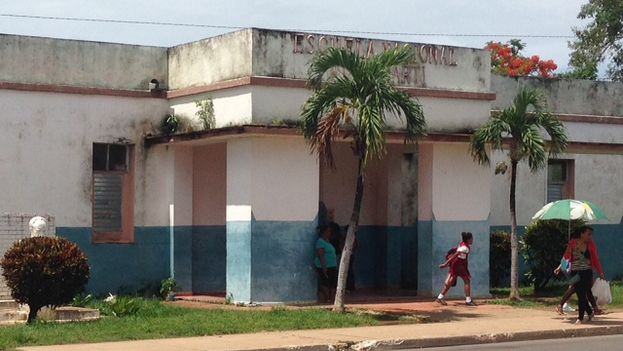
![]() 14ymedio, Luz Escobar, Havana, 20 August 2016 – The 2016-2017 school year starts in just two weeks and the authorities of the Ministry of Education are calling on people to take good care of school supplies given “the economic limitations of the country.” Department head Ena Elsa Velaquez Cobiella, also acknowledged the lack of teachers in several territories, a problem that last year amounted to a deficit of 10,300 teachers island-wide.
14ymedio, Luz Escobar, Havana, 20 August 2016 – The 2016-2017 school year starts in just two weeks and the authorities of the Ministry of Education are calling on people to take good care of school supplies given “the economic limitations of the country.” Department head Ena Elsa Velaquez Cobiella, also acknowledged the lack of teachers in several territories, a problem that last year amounted to a deficit of 10,300 teachers island-wide.
For the upcoming school year, among the provinces with the most significant lack of teachers are Ciego de Avila, where an exodus to other lines of work has caused a shortage of 663 education professionals. These positions will be covered, according to Barbara Rodriguez Milian, Provincial Director of Education, with “personnel contracted for on a hourly basis, a university contingent, and methodologists and the boards of directors of the schools,” as the official told the local press.
In Villa Clara, meanwhile, Director of Education Esperanza González Barceló recently acknowledged that there is “a deficit of over 1,000 teachers” in that territory. The official said that it was necessary to “seek alternatives” to cover the deficit, and said she will appeal to “professionals and college students, whether or not that have teaching degrees,” so work under contract.
The limited number of staff is a problem compounded by the physical state of the schools because, according to Gonzalez Barcelo, more than 60% of the schools in the province are in critical condition.
Santiago de Cuba province is one of the few that is in good shape, and according to local media has “filled all the positions” and created “a reserve of 620 teachers” for primary education. The department head said that the territory has “met the needs for pencils, notebooks and crayons” despite “the economic limitations of the country.
Education authorities have tried to play down serious deficit of teachers in the media as September approaches, and during an appearance in Camagüey, Velázquez Cobiella said that “more than 5,000 new teachers” just graduated from the School of Education and will take their places in front of classrooms nationwide in a few days, but that number fails to cover the accumulated shortages.
In a measure to accelerate the training of teachers, for the next school year, a teaching degree program will last only four years, not five as it had been up until the last school year.
New scenarios, such as the restoration of relations between Cuba and the United States have introduced some issues in the training of teachers, a detail that was not absent from the preparatory workshops for the new school year. Now teachers should emphasize during their classes on topics related “to the teaching of history, the prospects of relations between Cuba and the United States, the ideological and political subversion,” among others.
Since the fall of the socialist camp in Eastern Europe Cuban education has been undergoing an accelerated process deterioration, affecting materials and educators. The complaints of the population over the poor quality of teacher preparation, the reduction in the number of classes and the excesses of ideology when teaching certain subjects, have grown in proportion to the collapse of the sector.
The exodus of teachers into other employment sectors and emigration led the authorities to implement a teacher training program at the beginning of this century called “emerging teachers” – that is starting students not yet out of high school in teacher training programs and placing them in front of classrooms with as little as two years of preparation – as well as the introduction of classes taught by TV and videotape. These measures failed and are currently being reversed.
See also:
The Instant Creation of Emerging Teachers
Cuban Teachers Desert an Increasingly Despised Profession
The Challenges of Young People
From the Denial of the Denial to the Denial of the Obvious
They Taught Us to Lie, Steal and Pretend
